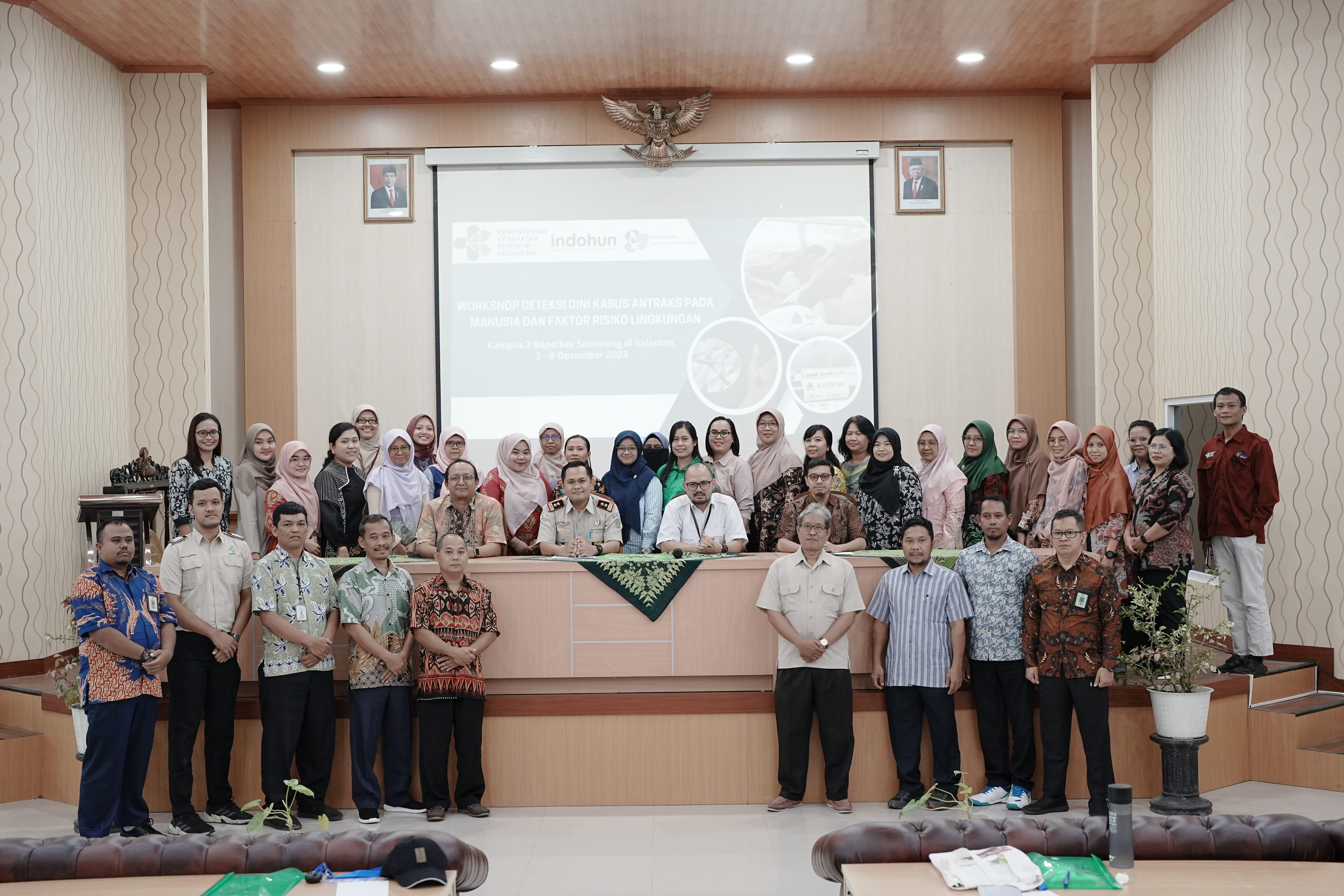Indonesia is one of the countries in Asia that serves as a hotspot for zoonotic diseases and emerging/new-emerging/re-emerging diseases, posing a health risk to both animals and humans. 70% of these emerging/new-emerging/re-emerging diseases are also zoonoses, which can contribute to the risk of outbreaks or Public Health Emergencies of International Concern (PHEIC).
Anthrax is one of the neglected zoonotic diseases that remains a global issue and a public health concern in Indonesia. This disease is caused by the bacterium Anthrax (Bacillus anthracis), which can generally infect all warm-blooded animals, including humans. The bacterium can form spores resistant to environmental changes and can survive for up to 60 years in the soil under extreme environmental conditions, making it difficult to eliminate with common disinfectants. The last reported cases of anthrax in humans were in July 2023 in Gunung Kidul Regency, with 93 serologically positive cases and 3 deaths (Case Fatality Rate 3.2%). Kabupaten Gunung Kidul in Yogyakarta is an endemic area for anthrax. Anthrax is enzootic and is considered a re-emerging disease, meaning it can recur with a high mortality rate in humans if not promptly diagnosed.
As a preparedness or early warning for anthrax and for the rapid diagnosis of cases, it is necessary to expand the reference laboratory for anthrax testing. The expansion of anthrax testing reference laboratories is carried out through training/capacity building for personnel via On-The-Job Training for the early detection of anthrax cases and environmental risk factors. This training is provided to laboratory personnel in Tier 4 Public Health Laboratories, prioritizing regions where anthrax cases are likely to be found, in accordance with the list of Public Health Laboratory units specified in the Minister of Health Regulation No. 25 of 2023 regarding the Organization and Work Procedures of the Technical Implementation Unit in the Field of Public Health Laboratories.
Recognizing the urgency, the Directorate of Health Surveillance and Quarantine, in collaboration with INDOHUN, has carried out the “EARLY DETECTION WORKSHOP ON ANTHRAX CASES IN HUMANS AND ENVIRONMENTAL RISK FACTORS.” This workshop is conducted with the aim of enhancing the knowledge and skills of health laboratory personnel in conducting anthrax examinations in the laboratory.
The series of activities was held for seven days from Sunday to Saturday, December 3-9, 2023, at:
- Campus 2 of the Health Training Center (Bapelkes) in Salaman, Magelang Regency (Jl. Magelang – Purworejo No. 48, Margorejo, Menoreh, Kec. Salaman, Kabupaten Magelang, Central Java 56162).
- Center for Environmental Health and Disease Control (BBTKLPP) in Yogyakarta (Jl. Imogiri Tim., Grojogan, Wirokerten, Kec. Banguntapan, Kabupaten Bantul, Special Region of Yogyakarta 55194).
- Center for Veterinary Services in Wates, Yogyakarta (Jl. Yogyakarta – Wates No.Km. 27, Gn. Gempal, Giri Peni, Kec. Wates, Kabupaten Kulon Progo, Special Region of Yogyakarta 55651).
This activity was attended by participants from the Laboratory and Surveillance teams from various Tier 4 Public Health Laboratories, including:
- BTKLPP Class II Ambon
- BBTKLPP Yogyakarta
- BTKLPP Class I Makassar
- BBTKLPP Surabaya
- Health Research and Development Institute (Litbangkes) Papua
- BTKLPP Class I Medan
- BTKLPP Class I Manado
- BTKLPP Class I Batam
- BTKLPP Class I Palembang
- BBTKLPP Jakarta
- Center for Vector and Reservoir Disease Research Salatiga
- National Laboratory Prof. Dr. Sri Oemijati
- BBTKLPP Banjarbaru
- KKP Class III Yogyakarta
- Health Research and Development Institute (Litbangkes) Aceh
- Directorate of Health Surveillance and Quarantine
This activity began with a report from the committee represented by INDOHUN, delivered by Agus Setiawan, S.KM, M.PH, providing a brief overview of the anthrax workshop. Following that, there were speeches and the opening address for the workshop by the Director of Health Surveillance and Quarantine, Ministry of Health (MOH), represented by the Head of the Yogyakarta Provincial Health Office, dr. Wisnu Trianggono, MPH. Subsequently, participants had the opportunity to take a group photo as a memento.
During the 5-day workshop, participants received relevant materials on the detection of anthrax cases in humans and their environmental factors. The topics covered during these 5 days included:
The first day, Campus 2 of the Health Training Center (Bapelkes) in Semarang at Salaman:
- Anthrax – Introduction, Global, Regional, National, and Distribution, Directorate of Zoonosis Control Team (Drh. Maya Esrawati)
- Anthrax in Indonesia: Kulonprogo Case Study; Human Cases, Epidemiology in Indonesia, Surveillance and Anthrax Response – Health Office of Kulonprogo (Drg. Th. Baning Rahayujati, M.Kes)
- One Health Approach – INDOHUN (Prof. Dr. Drh. Wayan Tunas Artama)
- Cross-Sectoral Policies in Zoonosis Eradication, Assistant Deputy for Disease Control and Prevention, Coordinating Ministry for Human Development and Culture (Drh. Rama Prima Syahti Fauzi, M.Si)
- How to develop an anthrax surveillance network in Indonesia and connect regionally, Assistant Deputy for Disease Control and Prevention, Coordinating Ministry for Human Development and Culture (Drh. Rama Prima Syahti Fauzi, M.Si)
- Social and Cultural Aspects in Anthrax Outbreak Control, Prof. Dr. Drh. Wayan Tunas Artama
Second day, Campus 2 of the Health Training Center (Bapelkes) in Semarang at Salaman:
- Enforcement of Diagnosis and Management of Human Cases, (Dr.dr. Dhani Redhono, Sp.PD-KPTI, FINASIM, Faculty of Medicine – UNS)
- Management of Anthrax Specimens in Human Cases, (Dr.dr. Dhani Redhono, Sp.PD-KPTI, FINASIM, Faculty of Medicine – UNS)
- The Role of the Lab in Outbreak Investigations, Dr. Endah Kusumowardani, M.Epid, Surkakes (Health Surveillance and Quarantine)
- Health Hazards of Bacillus anthracis (pathogenicity, host range, infection dose, incubation, zoonosis), (Dr. drh. Susan M Noor, MVSc, BRIN)
Third day, Campus 2 of the Health Training Center (Bapelkes) in Semarang at Salaman:
- Anthrax in Indonesia: Cases in Animals, BBVet Wates (Dr. drh. Ully Indah Apriliana, M. Sc.)
- Obtaining the Right Samples from the Right Environment, BBVet Wates (Dr. drh. Sri Handayani, M. Biotech)
- State-of-the-Art Methods for Detecting Anthrax, BBVet Wates (Dr. drh. Ully Indah Apriliana, M. Sc.)
- Considerations for Biosafety & Biosecurity in the Investigation and Diagnosis of Anthrax (sampling or clinical and environmental specimens, transportation, and testing), Dr. drh. Susan M. Noor, MVSC (BRIN)
- Receiving, handling, storing, and disposing of specimens, (Dewajani Purnomosari, M.Sc., Ph.D)
- Decontamination Techniques and Disposal through Disinfection and Fumigation, (Dewajani Purnomosari, M.Sc., Ph.D)
Fourth day, BBVet Wates Yogyakarta:
- Opening and Welcome Address, Head of BBVet Wates (Drh. Hendra Wibawa, M. Si., Ph.D)
- Safety Information, (Dr. drh. Sri Handayani Irianingsih, M. Sc)
- Screening of Anthrax Isolation Video, (Drh. Endang Ruhiat, Dr. drh. Ully Indah Apriliana, M. Sc)
- Presentation on Biosafety Management by BBVet Wates, (BSO Team – Drh. Siwi Susilaningrum accompanied by Drh. Endang Ruhiat, Drh. Bayu Priyo Kartiko)
- Presentation on Outbreak Investigation by BBVet Wates, (Drh. Rahmadi, M. Sc)
- Presentation on Epidemiological Investigation by Kulonprogo Health Office, (Dr. drg. Th Baning Rahayujati, M.Kes)
- Presentation on Epidemiological Investigation by BBTKLP, (Mieng Nova Sutopo, SKM, M.Kes)
Fifth day, BBTKLPP Yogyakarta:
- Welcoming Speech by the Head of BBTKLPP Yogyakarta: Dr. Darmawali Handoko, M.Epid
- Address by the Head of the SKK Team, Dr. Endah Kusumowardani, M.Epid
- Mobilization to the Laboratory, Mieng Nova Sutopo, SKM, M.Kes
- Field Visit to Assess the Readiness of the BBTKLPP Yogyakarta Laboratory for Examining Anthrax Specimens in Human Cases, INDOHUN, and the Labsurv Team, Directorate of Health Surveillance and Quarantine
- Discussion, Dr. Endah Kusumawardano, M.Epid
- Closing Remarks by the Director of SKK: Mr. Dr. Achmad Farchanny, MKM
During the five-day period held at BAPELKES Semarang, BBVet Wates, and BBTKLPP Yogyakarta, a workshop themed “Early Detection of Anthrax Cases in Humans and Environmental Risk Factors” was successfully conducted. Workshop participants enthusiastically engaged in a series of activities designed to enhance their understanding of anthrax, detection methods, and environmental factors influencing transmission risk.
Over the first three days, participants were involved in intensive material sessions covering crucial aspects related to anthrax, ranging from clinical symptoms to the latest technologies in disease detection. Interactive sessions facilitated the exchange of knowledge and experiences among participants, creating a dynamic and collaborative learning environment.
Subsequently, as part of the practical experience, participants were invited to visit the laboratories of BBVet Wates and BBTKLPP Yogyakarta. This visit provided in-depth insights into the laboratory-based anthrax detection process and allowed participants to apply the knowledge gained in a real-world setting. This is expected to enhance their skills in detecting and handling anthrax cases.
As a conclusion to the event, awards were presented to three participants with the highest post-test scores as a form of recognition for their dedication and efforts during the workshop. It is hoped that the knowledge gained and networks formed during this activity will contribute positively to early detection efforts and the management of anthrax cases in the community. The workshop not only served as a valuable learning forum but also strengthened collaboration among institutions in supporting overall public health.





Leave a Reply